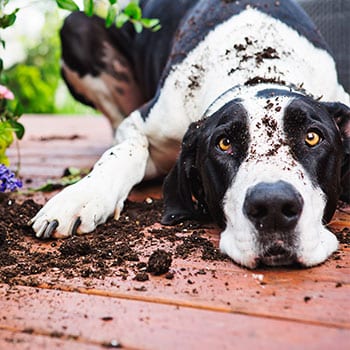It’s that time of year when we start looking for ways to spruce up our yard, and get rid of the things that shouldn’t be growing there. Pesticides and fertilizers, all containing potentially harmful chemicals, are being applied to plants, flower beds, and lawns. If you’re a pet parent, you probably already know that it’s important to choose pet approved products. You understand the significance of following the manufacturer’s instructions for applying pesticides and fertilizers, and you know your pets need to be kept off treated areas for a designated period of time.

What you may not know, is that the mulch you spread to enhance your garden’s appearance potentially represents a hazard for pets who can’t resist a taste. We’re offered more mulch options than ever, and while their names make them seem like a “natural” product, it’s important to remember that not everything “natural” is necessarily safe. One mulch to avoid if you have pets, is Cocoa Mulch. It can be sold as cocoa shell, cocoa bean, cocoa bean hull. Whatever name appears on the label, the mulch in the bag has the same toxicity as chocolate because both contain theobromine. In pets, theobromine is known to cause elevated heart rates, abnormal cardiac rhythms, seizures, diarrhea, vomiting, and in high enough doses…death.
If wood mulch is your preference, cedar mulch isn’t toxic, and for a few months it even acts as an insect repellant. That’s important to pet owners because Pliactic Acid, the naturally occurring oil contained in cedar mulch also repels fleas. However, if your dog likes to munch on mulch in your garden, no mulch is safe, because ingested in great enough quantities, it can result in a bowel obstruction.
Stones and rocks used in landscaping, while not toxic, are attractive to some dogs who like to eat them. The result is emergency surgery to remove an intestinal blockage!
The best way to minimize backyard problems, is to supervise pets during outdoor play. Don’t let them eat things they find in the yard, and don’t let them walk or roll in areas where they don’t belong. When they groom themselves and lick their paws, whatever has been picked up on their romp in the yard, is now inside their stomach! Also remember that you can endanger your pets and your family by tracking fertilizers and pesticides into the house on your shoes and clothing.
You can do more research on fertilizers, pesticides, and the dangers they represent to pets and people by visiting the websites of the following organizations:
Pesticide Action Network of North America
Pets and Pesticide Use Topic Fact Sheet: National Pesticide Information Center
Dogs and Pesticide Use: Alabama A&M and Auburn Universities
If you think your pet may have gotten into something toxic, call us right away at (732) 671-3110 and bring him in for evaluation. The “perfect lawn” is the one where you and your pets can enjoy the outdoors together…safety always comes first.
